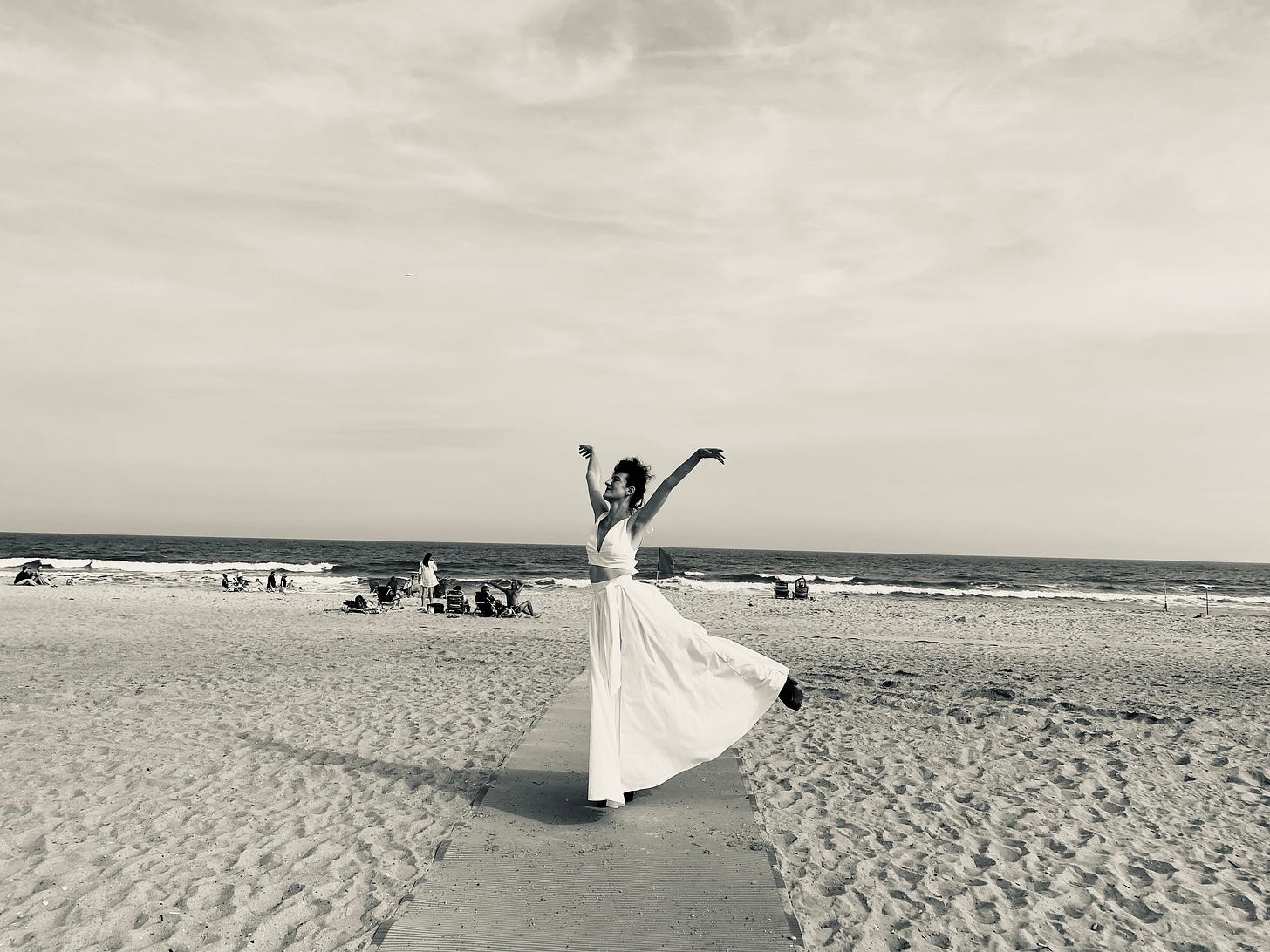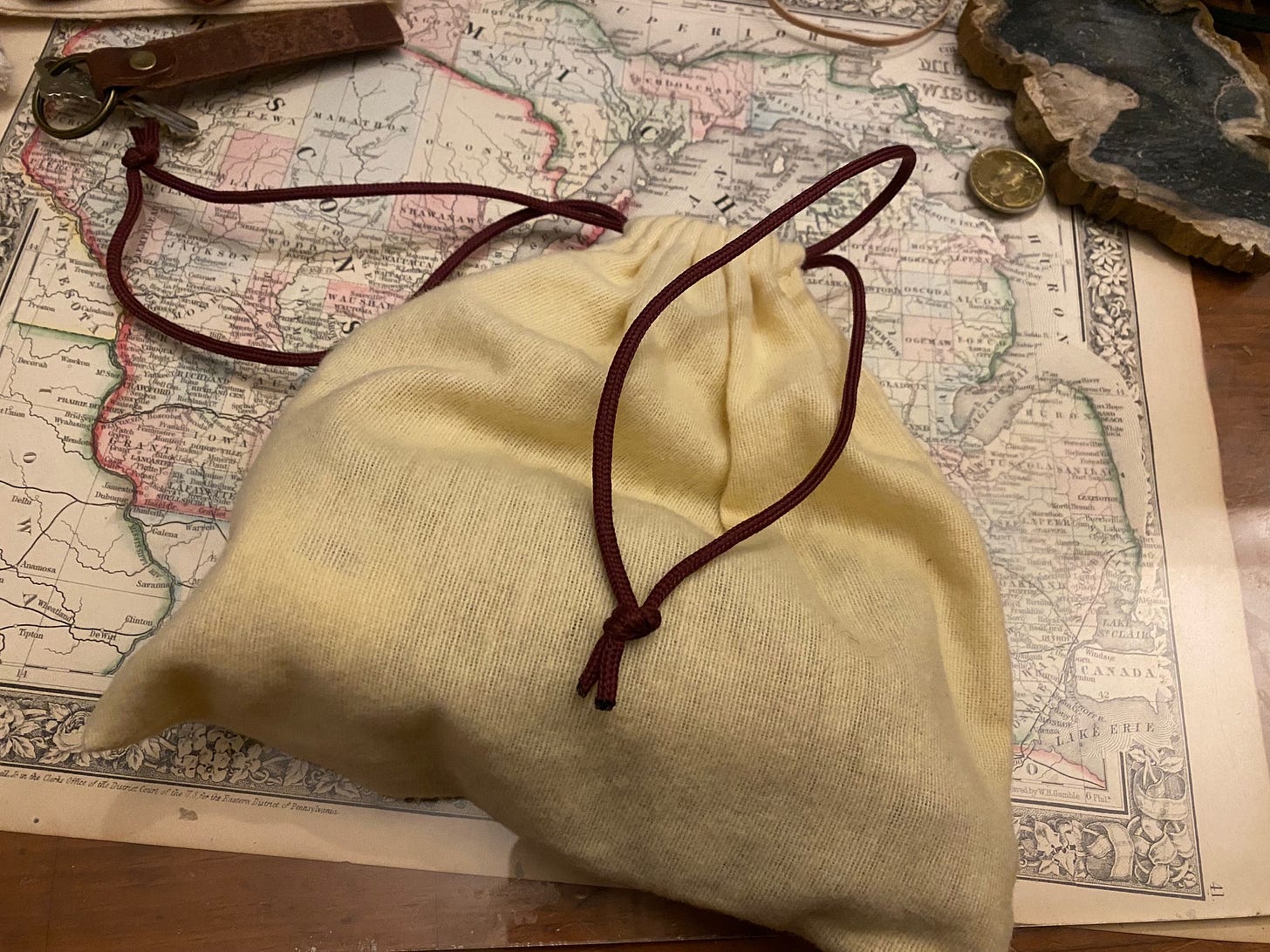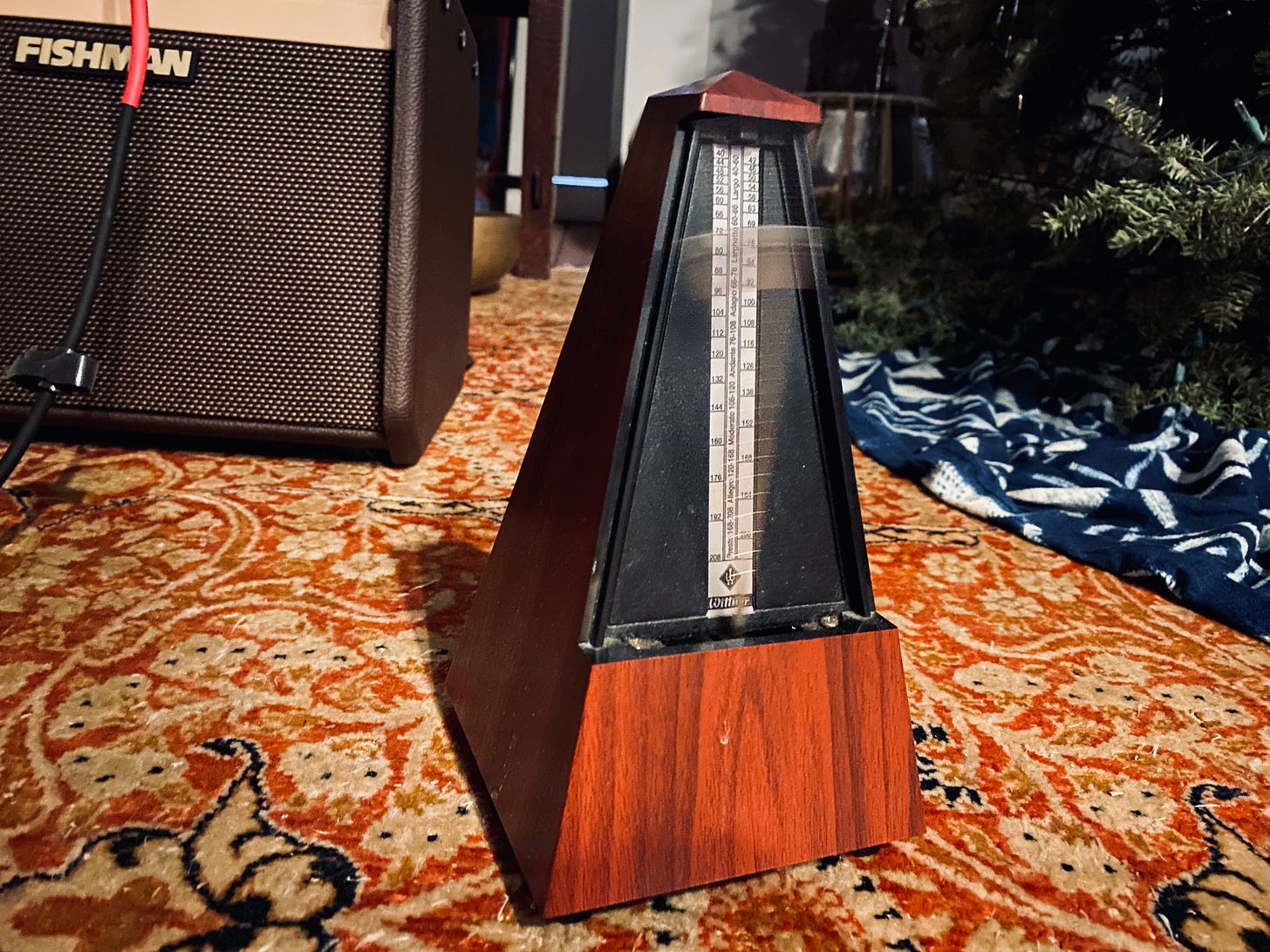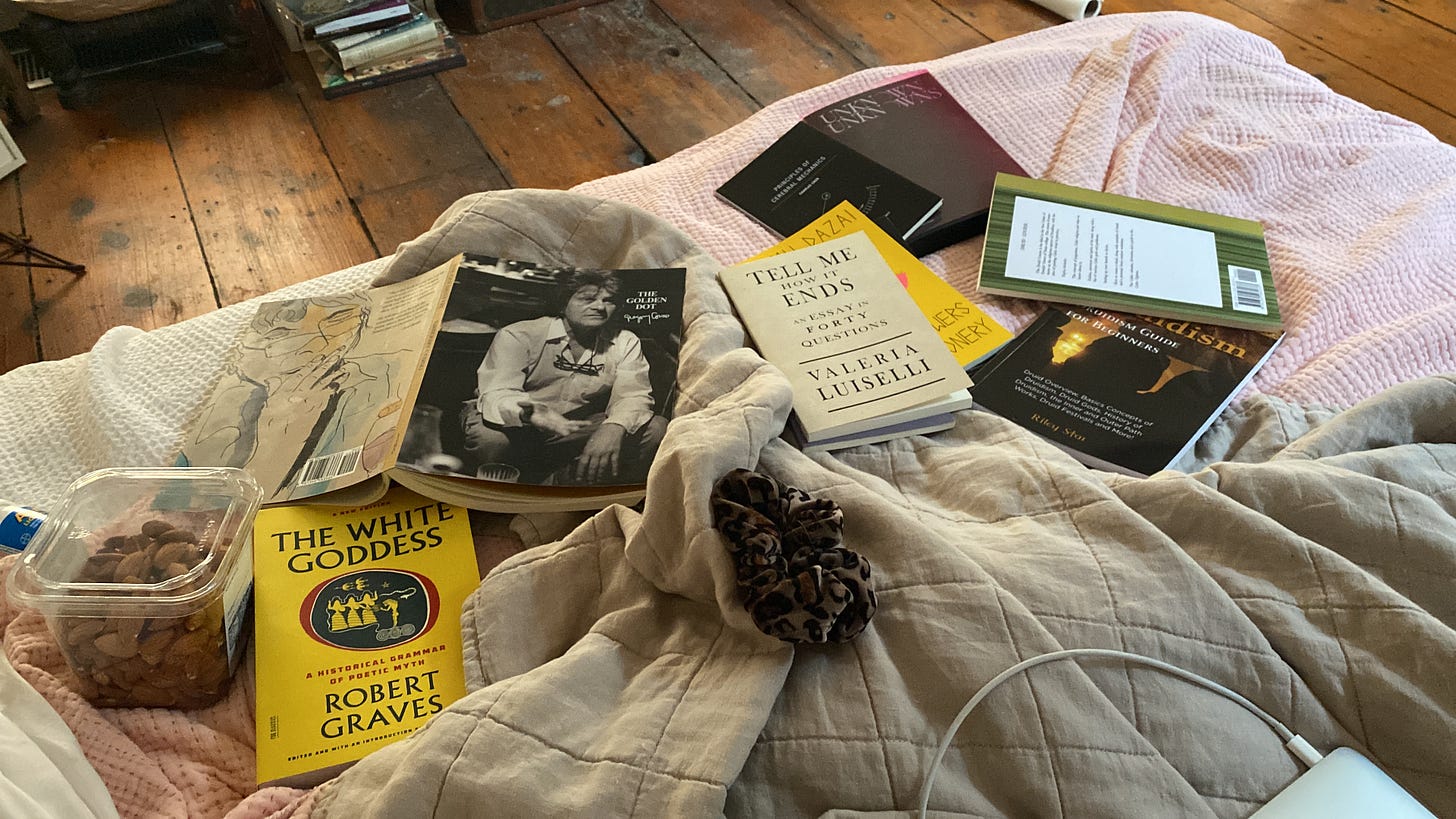There are many different types of lost objects in this world. Some lost items travel from hand to hand in one lifetime, misplaced by one person and found by someone else. They might be discovered unexpectedly while waiting on a subway platform, or sought out with laborious purpose while sifting through the beach sand with a metal detector. These objects exist strangely in two separate realities. For the person who found it, the object is part of a magical story, appearing in their lives like a mysterious treasure, imagining where it had been and all it saw before. For the object’s previous keeper, while the tale is one that ends with equal mystery, it can have a bit more melancholy or bittersweetness attached to it now. Belongings like this, things that we lose and never see again, often have a more sorrowful grief story. A sentimental or nostalgic object that is now sometimes too painful to think about. A family heirloom, a belonging of a departed relative. Something we borrowed from another person and lost, so there is a weight of guilt attached to it. Something we lent to someone else who misplaced it for us. Sometimes we lose a document or file of paperwork, and its loss causes a different brand of temporary stress or panic. Sometimes we lose our own work - either by our own mistake or at the hands of technology, and after exhausting the possibilities, without any way to recover it, we find ourselves having to accept the reality of this lost time and progress, starting over if and when we can muster the courage and clarity to do so. These are all losses, ones that we learn from and learn how to navigate. They are losses which shape the stories of our lives and the stories we tell as we move through time.
On the other hand, there is something mystical and interesting about lost objects that go missing and become found again. Something about them often seems to have shifted and changed, as though they went traveling on their own mysterious journey, but in reality, we are the ones who change upon their return. For separated from one another in this unexpected manner, we find ourselves reunited with a new appreciation for them. Maybe we lose something essential and utilitarian like our wallet or our keys, our phone or winter hat. Maybe a family object, a gift from someone special to us, a childhood treasure, a cherished book, a lucky charm, a favorite rock, anything.
I often think about St. Anthony when something is lost, as among other things, he is the Patron Saint of Lost Objects. There are different versions of the story explaining why he became known for this. The most common seems to involve a personal book of hand printed psalms that was especially precious to him, as it included his own notes and comments used for teaching students. One day it was taken without permission. Anthony was deeply saddened about this and prayed that it would turn up somehow or be returned. The person who had taken it was overwhelmed with feelings of guilt and brought the book back to him, asking for forgiveness. This special book became known then as the ‘Book of Lost Things,’ and in the future people would pray to St. Anthony when their own objects and cherished possessions went missing.
There are different ways that people conjure up the spirit of St. Anthony when something goes lost. Here is a fun and sort of funny rhyme that you can always remember:
“Saint Anthony, Saint Anthony, please come around. Something is lost and needs to be found!”
Or the simpler and sillier children’s version:
Tony, Tony, come around,
Something’s lost and must be found!
I don’t remember where or when I learned this, but it always seems to pop into my head when I’m having trouble finding something or when someone else is searching for a missing item of their own.
Here below is one of the prayers that is also used, and which I think is nice to recite in a faith practice or even to read as poetry or a beautifully written message:
Saint Anthony,
who received from God
the special power of restoring lost things,
grant that I may find what has been lost,
(mention your petition)
At least restore to me peace and tranquility of mind,
the loss of which has afflicted me
even more than my material loss.
To this favor, I ask another of you:
that I may always remain in possession
of the true good that is God.
Let me rather lose all things
than lose my supreme good.
Let me never suffer the loss of my greatest treasure,
eternal life with God. Amen.
St. Anthony is also the patron saint of the sick, the hungry, the poor, the elderly, sailors and fishermen, mariners and travelers, and the mail. I’m sure there are stories tied to each of these, and they also make sense when we think of each one in relation to ‘lost things’ and their recovery. Here are some stories and prayers including the ‘Litany of the Lost.’

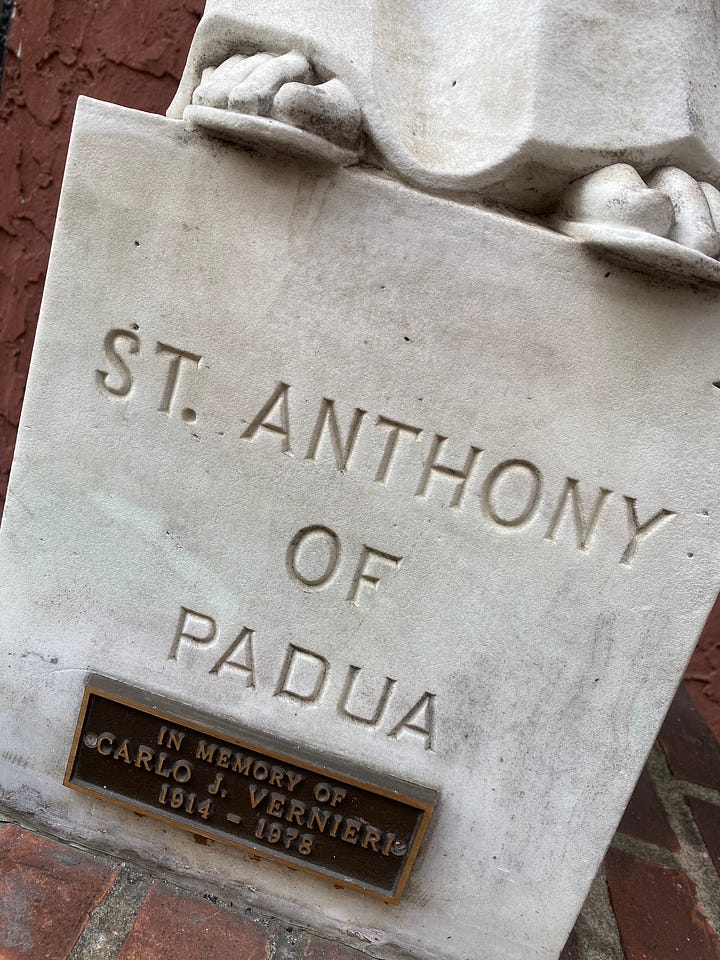
Did you ever lose an object or many objects, not just for a few days or a week, but for many months, or even years? And did you find that lost object(s) in an unexpected place, at an unexpected time? How did you feel when you found it again?
Is there any thought process, helpful mindset, ritual, or strategy you follow when you are searching for a lost item? Sometimes I wish I could be just a tiny bit more strategic in tracing my footsteps, like Sherlock and Enola Holmes, but I think for the most part I’m able to find my lost things pretty well.
The reason this subject is on my mind is because right now I’m feeling that particular sensation of celebration and victory as I just found something that’s been lost for a long while. For many months I was perplexed by the fact that I was simultaneously missing a handful of small precious objects: a carved silver ring shaped like an eagle, a pair of Grecian stone earrings my mom got for me in Athens for my 34th birthday present, a Petoskey stone from Michigan that a dear friend found and polished as a present for my 32nd birthday, a black resin Hotcakes necklace with a red butterfly I’d had for about 15 years, a single red heart earring made by Wendy Nichol (a Christmas present from her in 2021), a pair of old headphones that I liked, and a few other small utility items. I searched and kept my eyes open for each of these objects, and somehow it never occurred to me that they might all be together somewhere.
It was windy and cold the other day, and looking for a particular pair of warm gloves, I went over to my small wooden storage dresser with two sliding drawers. The top drawer is for winter gear: hats, scarves, gloves. The bottom drawer is for socks. I opened the top drawer, rummaged through until I saw the gloves, and withdrew them from the drawer to put on. I was moving quickly, getting ready to leave, but as I was pushing the drawer closed, I noticed a strange light colored fabric in the back of the drawer, peeking out from under a black scarf. I moved aside the scarf and picked up this little drawstring bag, which had a familiar feeling and weight to it. I had a sudden feeling that maybe something good was about to happen. I sat down on my desk chair with the bag in my lap, pulled the red drawstrings open, and looked inside to find a smaller gray pouch that I immediately recognized.
Every object I had been looking for was in there!! My eagle ring, the Petoskey stone. It all came back to me in one sweep of memory. I remembered putting the bag of objects into the little dresser for safe keeping. It was at a time when that drawer was completely empty, but it soon became a storage spot for my winter things in their off season, creating the perfect hiding place for the little pouch beneath swaths of woolen materials and dark shades of fabric, all tucked away until fall and winter returned.
I was so happy to find these special items, like discovering a treasure chest, a secret stash of pirate’s booty hidden at the back of the drawer, things that I thought had all been lost, that would perhaps never turn up again. The pouch was like a time capsule, and I pictured these objects watching me search for them all those months, shouting from the back of the drawer, “We’re in here!! Right here!! Look here!!”
I wanted to share this story because of a live long interest and personal connection with lost objects, particularly those that never return again, and also because of the significance of the eagle ring that I found. The silver ring was made by The Great Frog, a designer and jewelry maker based in London whose handmade work and craftsmanship I’ve admired for a long time.
I find the process and technique of making handmade metal jewelry so interesting. From the original concept, to the drawing, to the carving and casting, the materials and metals, the welding and soldering, the polishing and sizing. So many steps unseen, passed from hand to hand, finishing as a masterpiece like a tiny sculpture. I learned a lot about metalwork from the videos TGF has shared in the past, showing the process of a ring’s creation, starting from a raw idea in the mind of its creator, all to being worn proudly on the finger of an admiring individual.
In 2021, while we were locked down in our homes, I had the opportunity to do a small collaboration with The Great Frog for World Poetry Day. To celebrate this annual date, they asked me to make a video sharing a selection of poems for their social media accounts and website. I wrote a poem for them called Frog Metal (Verdigris), and chose a few poems and words from other writers to share. It was so exciting to meet and be connected with The Great Frog somehow, and through the very unexpected medium of poetry. I was so honored to be asked, and even though it was gift enough to me having a new chance to honor these brilliant writers and share a poem of my own, they generously offered me to choose a ring from their collection. I chose their ‘Soaring Eagle’ ring, and I loved wearing it on my index finger. It made me feel courageous to look down and see it flying across my hand. It reminded me of words, of poetry, and of writing. It reminded me of collaboration and also of solitude.

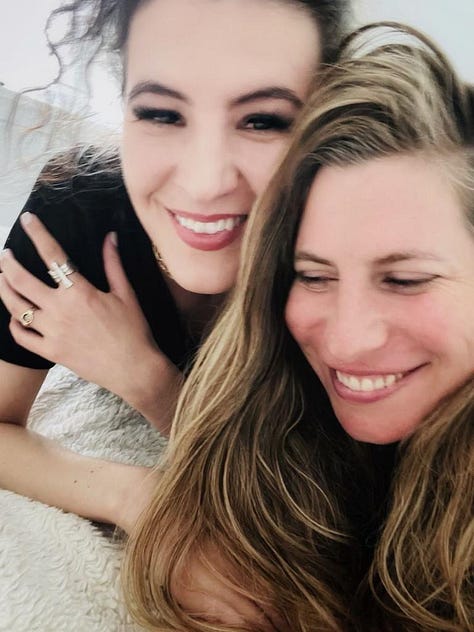

I was very sad to lose this ring, not just because it is such a beautiful and unique object that I felt honored to protect, not only because it was handmade and gifted to me by The Great Frog, but because it was also tied to writing and sharing a new poem. Of trying something new. So to me the ring was a symbolic reminder of many things, including the fact that poetry is a cherished and valued craft, and that while the act of writing poems is a personal and sacred practice, sharing them is also important to do sometimes, too.
We already know some of the symbolism and meanings of the eagle. In the lyrics I wrote for Legacies, there is a line that says, ‘did you notice how everything’s shifting when the eagle’s cracked?’ This is in reference to someone’s eagle ring that had broken in half in 2019. After using glue and other methods to sort of ‘half fix’ the problem, it continued to break over and over again. The ring didn’t need a temporary fix of glue or string, it needed to be soldered or welded, melted down and mended with intention, intelligence, and focused care. A sustainable solution. It felt to me like a metaphor for the urgent problems and broken solutions of the United States, whose national symbol of course is the bald eagle, so that is where the inspiration for that line of the song comes from.
Here are a few other meanings of the eagle:
For centuries, people have seen the eagle as a symbol of beauty, bravery, courage, honor, pride, determination, and grace.
The eagle encourages you to take more initiative and be more active, whether in your professional or personal life. It teaches you to take the lead without fear of others or fear of failure.
When an eagle appears, you are on notice to be courageous and stretch your limits.
If an individual has been going through a hard time, an eagle not only signals a new beginning, but provides that person with the stamina and resilience to endure the difficulties. If an eagle has appeared, it bestows freedom and courage to look ahead. The eagle is symbolic of the importance of honesty and truthful principles. Summon the eagle when you are about to embark on a challenge, a massive life change or a creative endeavor.
A teacher of mine said when I first wore the ring that it looked to her more like a sparrow. Here is what a sparrow can symbolize:
The sparrow is a beloved bird that has played an important role in culture and literature for centuries. Its symbolism has been used to represent themes such as love, loyalty, and hope.
I had lost this ring one other time, leaving it behind in my godmother’s car by mistake. She found it on June 29, 2021, 2 days after my birthday, and the day before her own. I was so relieved it felt like an extended birthday gift. I’m surprised that I lost it again after that, though it makes sense after losing it once that I would tuck it away somewhere I thought to be extra safe. A classic move.
An odd synchronicity about this ring’s story is also how its recent disappearance aligns strangely with my current situation in regards to poetry. As I wrote about in my first Substack post, I started writing poems as a regular personal practice when I was 14. I kept a diary when I was in middle school, but feeling that I wanted things to be a little more imaginative and mysterious, I switched from keeping a literal diary to writing poems about my experiences. If you wrote poetry as a teenager, maybe you can relate to this as an entry point. I had always liked writing them for school assignments, and something about the process just felt familiar and natural. It made me feel grounded and safe. This practice came to be so personally important to me as I grew, and along with playing piano, I found that poetry was something that greatly helped me to get through life. I never showed my poems to anyone, for the simple reason I didn’t write them with the intention of sharing them. I wrote them because I needed to, as a way of expressing and processing things that happened around me. Emotions and nightmares, life’s incidents and episodes, happy experiences and fears, observations and ideas. I was happily private with my sacred creative outlets, and it didn’t occur to me to share them with anyone else for any reason.
In 2005, when I was 17, as a sort of secret experiment, I submitted a poem I wrote about melting glaciers and climate change (global warming as we said then) to a poetry contest. I was nervous, eagerly waiting to hear back, and eventually I received a small printed certificate and gold colored coin as an ‘Editor’s Choice Award.’ I was so proud, so happy, and kept these things as a symbol of my first poetry recognition. Well, it turns out that site and the organization who held those contests was extremely controversial, investigated for its legitimacy, was given an ‘F’ rating, and went out of business in 2009. So my recognition from them seems to have been completely false and misleading. I didn’t know that at the time, so morale was kept high and I decided to give two poems to my school’s literary magazine, an even scarier chance to take. One of the poems, a short one called ‘Metronome,’ was printed fine. The other, a longer and more personal one called ‘Remembrance of Notes,’ was printed with the first half missing and renamed, ‘Untitled.’ I was deeply upset at the time, but I was learning lessons that turned out to be important ones, and I’m actually glad it all happened the way that it did. ‘Everything happening perfectly.’
One nice moment I do remember, was at an intimate gathering our school held for the senior class and their families before everyone said goodbye. Each teacher was appointed to (or chose maybe) a student or several students to say a few words about, and my music teacher was the one assigned to me. I listened as he said nice words about my disposition and musicianship, but the thing that really surprised me was when he mentioned my poem, Metronome, the one that had been printed correctly in the literary magazine. I was shocked when he quoted the last line from it, ‘so as we say goodbye as the opportune moment passes us by, we fade a little bit more, just to write a song that no one will ever hear.’ He then closed by saying how I needed to continue to write and share my songs and poems, and that he looked forward to hearing and reading them. I remember feeling this sudden mix of different teenage feelings - embarrassment and nervousness, wondering what the other students thought, but mostly, and above all else, I was touched. I was so moved that he had actually read my poems in the magazine, and I realize now that he was the only person to acknowledge or mention them to me at all. My mom had been a great source of encouragement, and she especially really loved the other poem that was printed with error. I suppose she was the first person I ever showed my poems to outside of submitting them to a teacher for a school assignment, and she was my first encouragement to continue writing them. That moment during my music teacher’s speech at the senior gathering was the first unexpected source of outside encouragement, through taking the time to read my words at all, through telling me bluntly and publicly to have the courage and confidence to keep going, and through vocalizing for all of us the importance not just of creating things for ourselves, but of sharing them with others, too.
I did keep writing poems, and poetry remained a personal mode of expression that saved my heart and cleared my mind many countless times. I rarely shared my words though, and if I did, it was in a sort of background fashion - my mom reading something at an event or using one as a voice over for a video project. I never read them out loud on my own, I never attempted to share or print them anywhere, and never submitted one for another poetry contest. It wasn’t because I was afraid, but more so because the process had become sacred and special to me. It was something I held close and dear. Writing was something I needed to do and I felt satisfied with the role it played in my life.
It was during the Covid lockdown in 2020 that I started to share in a new way, making videos for Instagram on dates like the Lunar New Year or Poem in Your Pocket Day. On August 1, 2021 when public gatherings were slowly starting to return to our lives, I read a poem aloud for the very first time in the Elizabeth Street Garden for one of their Poetry Sunday events. That was a big moment when things really shifted, and I felt this sort of breaking through from the secret privacy of process into the extroversion of sharing and connection. My friend Joseph who runs the garden was so encouraging and asked me to send him the poem after so he could read it again. I was so happy.
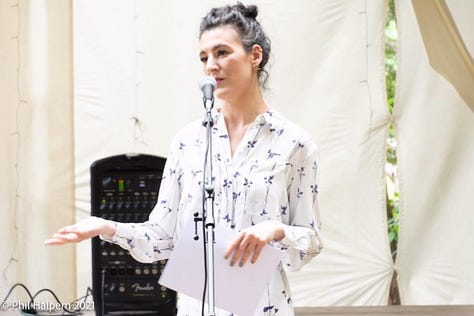
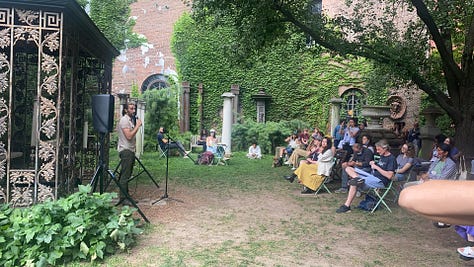
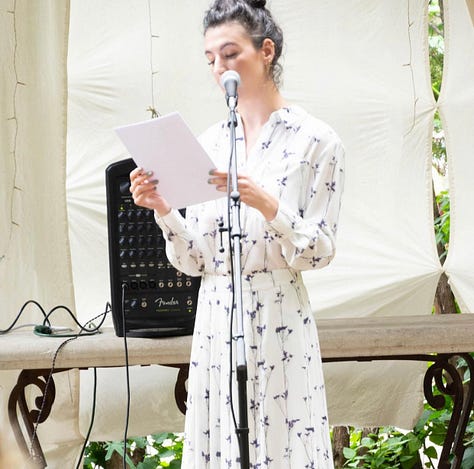
After that, I started down a more serious path of envisioning poetry as something to share on a larger scale, editing my favorite poems from the last 20 years (between the ages of 14 and 34), and talking with experts and teachers. Those things made me so happy, and though I was full of excitement, I realized that I wasn’t ready. I wasn’t ready to leave the secret inner world of process, where poetry had always existed, safely and contained. I’ve never had any formal writing training, and I didn’t realize the schools of thought that exist around poetry, the scholarly and collegiate side of the craft. I had always known it as I knew other creative outlets and modes of expression, as this natural terrain of wildness where anyone is welcome who feels the drive. Writing poems felt just like that, wild and free, like an open channel. Editing poems though felt very different. Different from editing essays or song lyrics. It felt strange and unnatural to me. It was as though I had pulled a loose thread on a delicate old sweater, that I had to learn and unlearn everything and start from scratch. It was all happening quickly, too quickly, and to be honest, I got overwhelmed. Something broke in me and I didn’t know how to fix it. Not only did I halt the process of editing my poems, but I stopped writing new ones altogether - I just wasn’t able to. I tried a few times, but everything had changed. Writing poems was no longer this clear and flowing channel of energy where my brain would be turned off. Instead, I would start writing and my mind would be flooded with the advice and instruction I had received, criticisms and editing remarks, a chorus of external voices clouding a simple intention. Writing poems had changed from something raw and pure, to something formulaic and organized. It went from something spiritual to something mental. My brain was jumbled and getting in the way. I had lost this special and sacred healing tool that had helped me navigate through life for such a long time. I was heartbroken and I put everything aside, literally shelving all the papers, hopefully for a later time.
Has anything like that ever happened to you? At any time of your life?
Now I am 36, about 1 and 1/2 years have passed since this happened, and I feel different now, seeing things in a completely new light. A few experiences brought this change. First and foremost was when I had Covid in August 2023. I was sick in bed for more than 3 weeks, a mix of Covid illness and healing from a broken heart, and during that time I read ‘The Golden Dot,’ a book of poems by Gregory Corso, edited and compiled together by Raymond Foye. Many of the poems in this book are about the actual process of writing poetry, and about something that shifts and changes when you go from private to public with your words. Reading these thoughts from someone whose work I admire made me realize that the experience I had was universal, that others would be able to relate, and this was very comforting for me. I realized that so many of us have stories tied to our creative process that make us feel lonely and scared, but in reality, these are stories that when shared with each other, can help us experience the magical balm of solidarity. Along with dear Cairo, The Golden Dot and Gregory were my companions while I was bedridden and sick. Reading this book paired with many helpful conversations with my mom, trusted friends and mentors, my own processing of it all, and the beautiful magic of growth that comes from experience and time, helped me to understand and relate to the craft of writing and sharing poems in a new way. I realized what I wanted to do, and I felt ready for it. 2024, I thought. Wood Dragon Year. That’s the time.
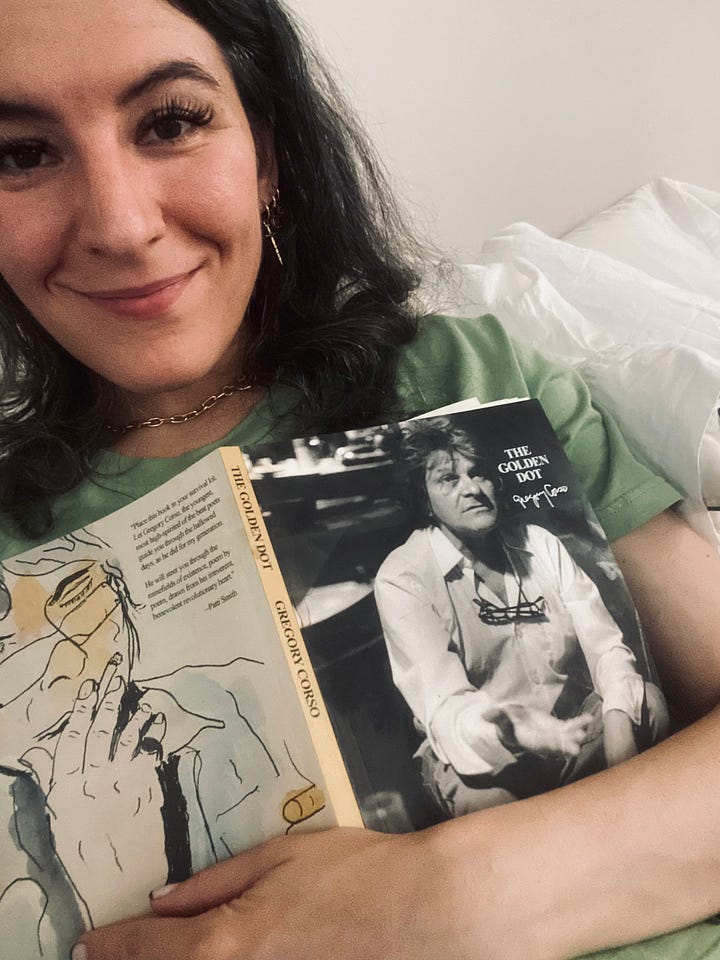

I was recently asked to describe what ‘creative process’ means to me. This is what I wrote:
As a person who feels the pull of creative impulse, I feel extremely blessed to have access to these outlets. It is not something I take for granted, and I feel thankful for it every day. For me, the process itself is personal and sacred, and the process belongs to the artist. It is the private drive to express which gifts to us this opportunity to process emotions and experiences from our lives. Practice not Perfect: this pure reason for making things - be it writing, music, drawing. It is a need that cannot be ignored, a feeling that cannot be shaken. It is the divine channel of energy that helps us to get through life when we are fully open to it. That is the process, the impulse to create. It’s both a tool of survival and a medicinal healer for the self. This secret inner world where everything feels holy and safe. Then there is the transition between process and sharing, when we abandon the work, separate it from our secret space and give it to the world. That is where purpose comes in. I believe in this formula: skills+helping others=purpose. For me, there needs to be a purpose in sharing the work. I’m sure this point of view will change or evolve, refine with nuance as I get older and as I share more, but I feel the work that enters the ether space of the world needs to do so with a purpose. Creating doesn’t need to have a purpose, in fact I think that most of the time, it shouldn’t. It’s a practice, a sacred practice where the mind can be ‘off,’ where one can tune into themself and the source with pure authenticity. It sounds dramatic, but it is so simple. Especially in these times where there is so much competition and comparison, and this time of social media where most everything created or experienced is driven by the purpose of sharing it publicly, I think it’s more important than ever to protect this sacred and protected practice of pure creation, pure experience, pure process. So when I do decide to share something with others, I like to be intentional about why it’s breaking through the barrier, and why I am asking others to give their eyes and time to it. I like to recognize the reasoning behind it, and share with purpose. If the writing or story can help somehow, if the imagery or film can be of service in some way. I ask myself, ‘what can this do?’ If the lyrics or feeling of a song can help someone, if a story can serve as support in some way. I create things that help me express and process various feelings and experiences, from joy to anger, from sorrow to fear, but for me, everything needs to end with hope. Even if a song of mine is about heartbreak or the destruction of nature, it needs to have a feeling of hope at the end, because for me, being solution-oriented is extremely important. Expression of pain, processing of the experience, healing through it, and gaining tools to continue through life. I want my work to always face the truth - the reality and the seriousness of things, though I also want to offer tangible solutions, a reason to continue on, to offer hope. We need to feel our interconnectedness, we need solidarity, harmony, community. Shared pain is deeply important, and the light of hope is everything.
While I didn’t originally intend to share these thoughts with you all today, I followed my heart of where I needed to go, of what I needed to write about, the needs of my own process. In the real time of writing this post, of sharing the story about finding my eagle ring, I revisited the story of my own writing and poetry, and I’m setting an intention now to revisit my manuscript for 2024, even for the sole reason of taking the reigns and reclaiming part of myself, to reacquaint myself with my words, and to see what can emerge from completing a process that scared me two years ago. No matter what happens, I feel there is something I need to learn and discover, and I am ready to find out what that is. I am still a little scared, but I’m going to do it anyway. Remember that from the Joan of Arc post? :)
Sometimes, if we are able to, what we really need is to step away from things for a moment, to put a little time between, to have the space to process and evolve to a new headspace in order to feel ready. I really wasn’t ready two years ago, and I see things more clearly now, with fresh eyes and new perspective. I believe that losing my eagle ring during that time was significant in some way, and finding it now, at this moment, is significant once again. I really believe that things happen as they’re meant to, and having faith and trust in that can really help us, especially in those scary moments when the future is more foggy and we can’t see even one step in front of us.
Starting my own account on this Substack platform has been a big part of this story. Taking a new step forward in my writing, and asking you to share with me in this process, to imagine and build a new creative space together. I am so grateful for all of you, for your encouragement and kindness, the unwavering support, for your warmth and honesty. I really feel safe sharing with you all, and my hope is that in some way, this experience can offer you the same encouragement you’ve offered me, to step forward in some way in your own healing, your own goals and processing, to be extra kind to yourself, to be vulnerable, to take new chances and risks, to enter full heartedly into endeavors that mean the world to you.
I want to share now what I had originally intended to - a few poems from the original World Poetry Day collaboration and some words about lost things. After writing these unexpected paragraphs and seeing that phrase again, ‘lost things,’ I’m smiling because I realize it wasn’t just the eagle ring that had been lost, but my poetry practice was lost, too. I found my eagle ring, and I hope that I also found my poetry practice again. It might be slow to return fully, and it might look different than it has throughout my life, but I am feeling open and curious, ready to rediscover it again. My poems might be flawed and in need of evolution, but they’re authentically mine and honest, and that’s the best that any of us can do - just to be ourselves. :) Practice, not perfect. <3
**In case you’re interested, the bottom of this post also has a recording of me reading this poem aloud, along with a few others to read.**
Frog Metal (Verdigris)
The alchemical bliss that shifts and changes
within the magical revolution of this circular band
easing round and round to celebrate the human hand
the human face
the human form
the human experience
joined we are by existence today
lunar wanderers of earth’s revolverie
and though the metals melt like lava
they are formed into a story told.
The process is like music -
with planning and preciseness,
intuition and energy
captured like a capsule of time
into a tangible shape
the sound of scoring the molten ideas
the steps of evolution from ether to ore
from formlessness
to paper drawn
from liquid to solid form
and leaving the hands of the creator
to join a new hand
where a new story begins
the journey of a gem
of a rock
a metal band
it has no real beginning
and no foreseeable end
for materials
live forever in one form or another
and long before the idea took shape
in the mind of the fabricator
the mind existed still
and the alloy was waiting somewhere
to be shaped and formed into this
sculpted expression
for the amulet is a beating heart
and
rubies
emeralds
sapphires
can be watchful
and reassuring eyes
their potent magic and power
idle stones
alive with life
and the element of pure metal
malleable and strong
falling like leaves from a golden sky
silver strands within shadowed hair
reminding us that while life is fleeting
in its cursory moments
we are protected by the earth and its heavens
and we can always rise above
Jesse Paris Smith, 2021
Here below are the other poems that I read in the video.
This first haiku from Matsuo Basho, was my mom’s suggestion to read. I chose these four versions from a group of 32 different translations. You can visit the link to read more of them, and there’s probably even more still. You could even write your own version, too. :) It’s amazing, a haiku is only 17 syllables, such a small grouping of words, and this list of translations shows how words have such power to permeate through languages and cultures to connect people together through one simple idea and observation. It’s so moving and nice to think about.
Frog Haiku from Matsuo Basho
At the ancient pond
a frog plunges into
the sound of water
Translated by Sam Hamill
old pond
a frog leaps in —
a moment after, silence
Translated by Ross Figgins
ancient is the pond —
suddenly a frog leaps — now!
the water echoes
Translated by Tim Chilcott
Within aging pond
frogs jumping vibrate the calm
water’s resonance
Translated by Sarah Isbell
Next I shared an excerpt from the book Pearl by Jane Draycott. Here is an explanation on what the book is about:
In a dream landscape radiant with jewels, a father sees his lost daughter on the far bank of a river: "my pearl, my girl." One of the great treasures of the British Library, the fourteenth-century poem Pearl is a work of poetic brilliance; its account of loss and consolation has retained its force across six centuries. Jane Draycott in her new translation remakes the imaginative intensity of the original. "This is," Bernard O’Donoghue says in his introduction, "an event of great significance and excitement," an encounter between medieval tradition and an acclaimed modern poet.
Next was a poem by Emily Dickinson. During the video I couldn’t find the one I was hoping to read (I’m not sure which one it was), so I shared one from the page where a dried plant had fallen out of my book to mark a spot. It wasn’t the one I had picked, but a poem from Emily is always a great choice.
Bring Me The Sunset In A Cup
Bring me the sunset in a cup,
Reckon the morning’s flagons up
And say how many Dew,
Tell me how far the morning leaps
Tell me what time the weaver sleeps
Who spun the breadth of blue!
Write me how many notes there be
In the new Robin’s ecstasy
Among astonished boughs
How many trips the Tortoise makes
How many cups the Bee partakes,
The Debauchee of Dews!
Also, who laid the Rainbow’s piers,
Also, who leads the docile spheres
By withes of supple blue?
Whose fingers string the stalactite
Who counts the wampum of the night
To see that none is due?
Who built this little Alban House
And shut the windows down so close
My spirit cannot see?
Who’ll let me out some gala day
With implements to fly away,
Passing Pomposity?
-Emily Dickinson
And closing with a poem from the great Sylvia Plath, a poet who I feel a special connection with that I’ll share more about on another post sometime soon. Each of these writers deserve so much of our gratitude and could have a whole post dedicated just to them, to their words and their stories, to all they’ve given to us.
Dark Wood, Dark Water
This wood burns a dark
Incense. Pale moss drips
In elbow-scarves, beards
From the archaic
Bones of the great trees.
Blue mists move over
A lake thick with fish.
Snails scroll the border
Of the glazed water
With coils of ram's-horn.
Out in the open
Down there the late year
Hammers her rare and
Various metals.
Old pewter roots twist
Up from the jet-backed
Mirror of water
And while the air's clear
Hourglass sifts a
Drift of goldpieces
Bright waterlights are
Sliding their quoits one
After the other
Down boles of the fir.
-Sylvia Plath
Thank you for reading those poems and for participating here with me. I am feeling good, sitting at my desk, writing here to you, and looking down at my eagle ring flying once again across my hand. I’m also feeling grateful again for The Great Frog, for this experience I had thanks to them. I decided to look up the symbolism and meaning of frogs, and as you can imagine, I was quite happy to read these words:
Symbolism of the frog:
In Native American tales, the frog stands for transformation and growth. These meanings transcend into the spiritual world, where the frog symbolizes cleansing, renewal, and the endless cycle of life and death.
In many cultures, frogs are often seen as symbols of transformation and good luck. If a frog visits you in a dream or in real life, it could be interpreted as a sign of transformation or change in your life. It might also symbolize cleansing and renewal.
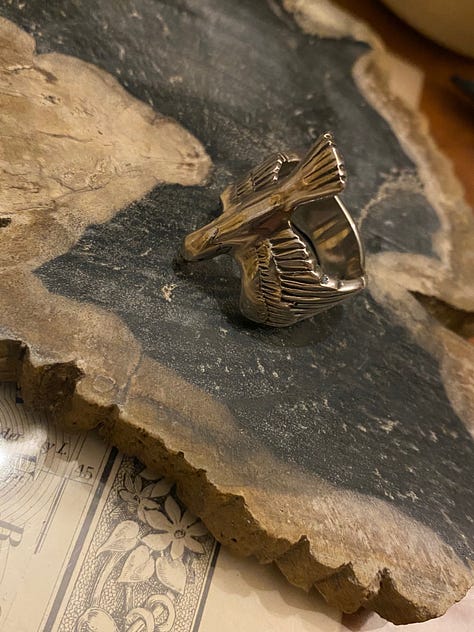


Is there anything you want to start again or revisit with a fresh perspective? Is there anything of yours that you are missing and looking for? Originally I thought we would focus solely on objects, but what about your own project, a wellness or creative practice, or the extra fire and self confidence it sometimes requires to get things done? Does this story remind you of any time you lost something and found it again? A physical object with its own symbolism and meaning, or something else, like courage or hope? I would love to hear your stories and memories, and what ideas and thoughts came up for you when reading this.



